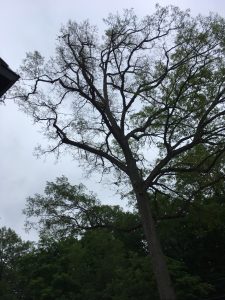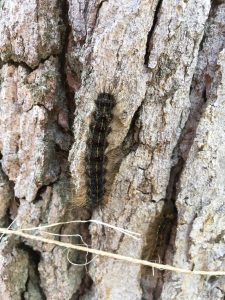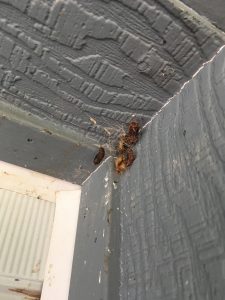Gypsy Moth caterpillars have infested the southwestern corner of Winans Lake, affecting neighbors on Community Drive and Winans Drive. These highly invasive and destructive pests have defoliated many oak trees, created significant mess with the frass (caterpillar poop) and leaf litter that results from their perpetual feeding, and have threatened the health and life of the oak trees that they feed on.
When you are walking in this area you will notice oak trees that have been totally or partially stripped of leaves. You can hear the caterpillars eating and the frass falling, it sounds like rain. The frass looks like small black seeds.
Because the Gypsy Moth is a true invasive, it has no natural predators. Several of the neighbors in the area had their trees inoculated by the Arborist at Family Tree Doctor in Howell. Though many of the caterpillars died, the infestation is so massive, according to the arborist, that caterpillars from untreated trees continued to pillage the oaks in an expanding area.
Please check your oak trees for evidence of the caterpillars. It is vital that we track the invasion so that we can successfully stop it next spring. The danger for the Winans Lake community is that the infestation will increase and the affected area will grow. As caterpillars, the gypsy moths move from tree to tree either over land or from tree canopy to tree canopy. However, the caterpillars will transition to cocoons and then hatch into moths over the summer months. The moths can travel further distances, laying zillions of eggs masses that will hatch the next spring, repeating the destructive cycle that is in process while involving more trees. This article provides more detailed information on the gypsy moth life cycle. https://www.roscommoncounty.net/221/Gypsy-Moth-Life-Cycle.
Currently the caterpillars are transitioning to the cocoon stage. Homeowners can look for and destroy cocoons now, and later in the summer it can be helpful to destroy the egg masses. These links provide information on techniques and products: https://pubs.ext.vt.edu/2811/2811-1021/2811-1021.html and https://www.planetnatural.com/pest-problem-solver/tree-pests/gypsy-moth-control/
If you are interested in working together to manage the infestation or to coordinate efforts to control the gypsy moths next spring, please contact Mary Anderson at maryanderson888 at msn dot com. She has been in contact with Hamburg Township and the MSU County Extension service to inform them of the infestation and to discuss possible intervention options.


